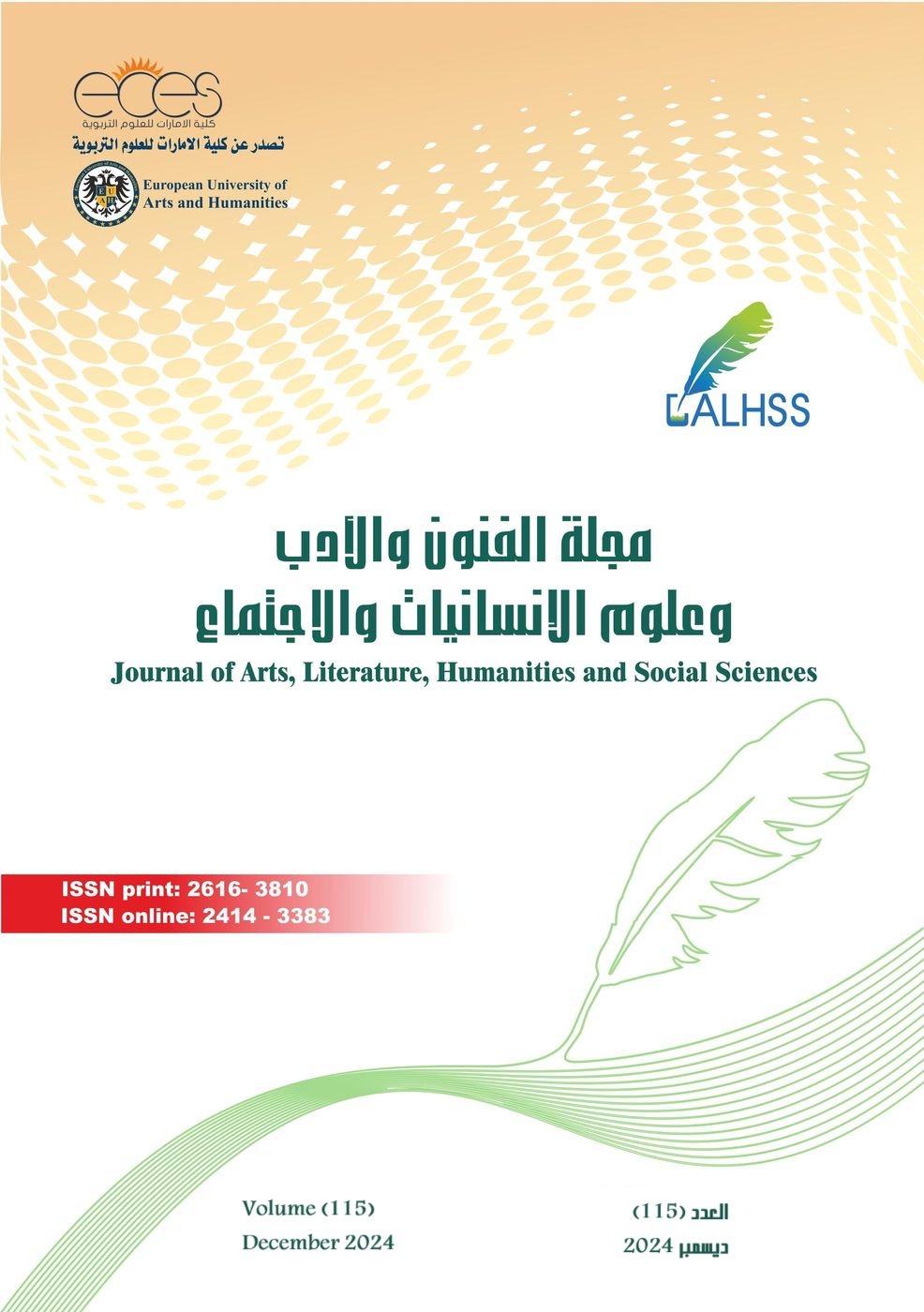Experiences of Saudi Universities in adopting Professional Certificates and the Challenges they face
Abstract
This study aims to analyze the experiences of Saudi universities in adopting professional certifications in e-learning and training, including the Online Teaching Training (OTT) certification, e-Learning Experience Design (eLXD) certification, and e-Learning Quality Assurance (eLQA) certification. The research focused on examining the strategic plans and practical implementations adopted by Saudi universities for these certifications, as well as highlighted the role of the National Center for e-Learning in facilitating the adoption process through providing technical and administrative support to ensure alignment with national quality standards. The research employed a qualitative approach using a case study methodology, collecting data through semi-structured interviews with eight participants selected from two Saudi public universities and the National Center for e-Learning. The findings revealed that offering professional certifications requires productive collaboration between the National E-Learning Center and the participated universities reflected on developing strategic plans to obtain necessary licenses, designing programs based on approved quality standards, obtaining accreditation from the National Center, and implementing and continuously evaluating the programs. Ongoing technical and pedagogical support from the planning stage through implementation and evaluation was one of the key enablers that helped universities achieve the desired outcomes. Based on these findings, the research presented recommendations to improve strategies for implementing professional certifications, emphasizing the importance of providing continuous training and technical support to ensure maximum benefit from these initiatives.
References
2. احمد،ياسر سعد.(2016).واقع التعلم والتدريب الإلكتروني في المملكة العربية السعودية. المجلة العلمية لجامعة 6 أكتوبر(1)3، 134- 153.
3. البجالي، عبد الحميد، ويونس، عبد العليم. (2022). درجة مساهمة الدورات المفتوحة عبر الإنترنت (MOOCs) في التنمية المهنية لمعلمي الحاسوب في مدينة مكة المكرمة وميولهم تجاهها. المجلة العربية للتربية النوعية، 6(23)، 333-370.
4. الجهني، لمياء . (2017). الدورات المفتوحة عبر الإنترنت ودورها في دعم التحفيز واستراتيجيات التعلم الذاتي. مجلة الدراسات التربوية والنفسية، 25(4)، 228-257.
5. الزايدي، محمد. (2019). وضع تطبيق مبادئ الحوكمة في مكاتب التعليم بجدة من وجهة نظر المشرفين التربويين. مجلة جامعة أم القرى للعلوم التربوية والنفسية، 11(1)، 1-44.
6. عبد الهادي، أيمن. (2020). فاعلية المقررات الإلكترونية مفتوحة المصدر واسعة الانتشار(مووك) في تطوير الأداء المهني للمعلمين واتجاهاتهم نحوها. المركز القومي للبحوث التربوية والتنمية بالقاهرة، 19(37)، 473- 535.
7. العتيبي، عبد الرحمن مسفر، والسواط، نسيم حمود. (2022). تصورات المعلمات نحو توظيف بيئات التعلم التكيفية في العملية التعليمية. مجلة کلية التربية بجامعة أسيوط، 39(2.2)، 135-179.
8. العوضي، زاهر. (2017). الشهادات الاحترافية: دورها في تحسين الكفاءات المهنية ودعم التميز في مجالات التعليم والتدريب الإلكتروني. رسالة ماجستير غير منشورة، جامعة مؤتة.
9. الفهيد، نورة. (2020). أثر التدريب الإلكتروني على تطوير المهارات التعليمية في المؤسسات الأكاديمية. مجلة التعليم والتدريب الإلكتروني، 18(3)، 120-145.
10. محمد، علي. (2022). استراتيجيات تطوير كفاءة المدربين في التعليم الإلكتروني: دراسة في الجامعات السعودية. مجلة التعليم العالي، 15(3)، 112-130.
11. مرعى، صفية محمد، وصالح، إيمان صلاح. (2022). فعالية برنامج تدريبي قائم على المقررات الالكترونية مفتوحة المصدر في تنمية الاستعداد للتعلم الإلكتروني لدي معلمي الحاسب. مجلة كلية التربية بجامعة بني سويف، 19(115)، 206- 233.
12. المركز الوطني للتعليم الإلكتروني. (2020). المؤشر الوطني للتعليم والتدريب الإلكتروني. مسترجع من: https://nelc.gov.sa/sites/default/files/media/document/nkpi2020.pdf
13. المسعد، بدور، والصفار، رباب، وبوحمد، أحمد. (2021). المقررات الإلكترونية المفتوحة واسعة الانتشار (MOOCs) في البحث العلمي في العالم العربي: دراسة منهجية للأدب المنشور. مؤتة للبحوث والدراسات - سلسلة العلوم الإنسانية والاجتماعية، 36(1)، 143- 180.
14. اليونسكو. (2019). دليل عملي للاعتراف بالمؤهلات: تنفيذ الاتفاقية العالمية للاعتراف بالمؤهلات المتعلقة بالتعليم العالي. منظمة الأمم المتحدة للتربية والعلم والثقافة https://unesdoc.unesco.org/ark:/48223/pf0000374905_ara.
15. Ali, K. Q., Soofi, S. B., Hussain, A. S., Ansari, U., Morris, S., Tessaro, M. O., ... & Merali, H. (2020). Simulator-based ultrasound training for identification of endotracheal tube placement in a neonatal intensive care unit using point of care ultrasound. BMC Medical Education, 20, 1-11.
16. Ahmed, Yasser Saad Mahmoud. (2017). The reality of e-learning and training in the Kingdom of Saudi Arabia: a strategic choice to achieve national aspirations and anticipate the future. Scientific Journal of October 6 University, 3(1), 134-153.
17. Al-Akhras, Muhammad. (2019). The role of professional certificates in enhancing electronic training for education specialists. Journal of Educational and Technical Studies, 15(2), 123-145.
18. Christopher, D., et al. (2021). The challenges faced by universities in adopting professional certifications: A case study in e-learning. Journal of Educational Technology, 34(2), 45-62.
19. Koniuk Group. (2020). Implementing professional certifications in international higher education: A focus on digital transformation. Higher Education Review, 15(4), 89-102.
20. National Center for E-Learning. (2020). National index for e-education and training. Retrieved from: https://nelc.gov.sa/sites/default/files/media/document/nkpi2020.pdf
21. Patel, R., & Adams, L. (2020). Impact of Online Training on Professional Competence. International Journal of E-Learning, 22(3), 205-220.
22. QuestionPro. (2016). Qualitative research: Definition, types, and examples. QuestionProhttps://www.questionpro.com.
23. Smith, A., & Johnson, B. (2021). E-learning and Professional Development: Exploring Online Training Approaches. Educational Technology Publications.
24. Selvaratnam, S., & Sankey, M. (2020). Adoption of micro-credentials in higher education institutions in Australia and New Zealand: Opportunities and challenges. Journal of Educational Technology, 12(3), 45-58.
25. Tang, John. (2021). The impact of COVID-19 on the demand for professional certifications in online education: Accelerating the development of human resources for remote learning. Journal of Online Education and Technology, 15(4), 123-145.
26. UNESCO. (2019). A practical guide to the recognition of qualifications: implementing the Global Convention on the Recognition of Qualifications for Higher Education. United Nations Educational, Scientific and Cultural Organization https://unesdoc.unesco.org/ark:/48223/pf0000374905_ara.
27. University, 19(115), 206-233.
28. UNESCO. (2019). Assessment practices in online learning: The role of continuous feedback in enhancing learning outcomes. United Nations Educational, Scientific and Cultural Organization.
29. University of Cambridge. (2018). Developing sustainable assessment strategies in digital learning environments. Cambridge University Press.
30. Wilson, T., et al. (2020). The impact of sustainable training programs in enhancing the implementation of professional certifications at universities. Journal of Online Education, 26(2), 90-105.
Copyright (c) 2024 ندى علي الاسمري , د. نهى فهد الطويرق

This work is licensed under a Creative Commons Attribution-ShareAlike 4.0 International License.



